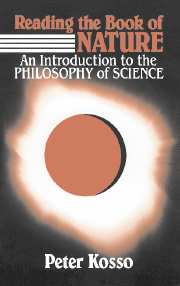Book contents
- Frontmatter
- Contents
- Acknowledgments
- Introduction
- 1 Theories
- 2 Internal and External Virtues
- 3 Explanation
- 4 Confirmation
- 5 Underdetermination
- 6 Observation
- 7 Blurring the Internal–External Distinction
- 8 Coherence and Truth
- 9 Objective Evidence
- 10 Science and Common Sense
- Glossary of Terms
- Suggested Reading
- Index
10 - Science and Common Sense
Published online by Cambridge University Press: 05 June 2012
- Frontmatter
- Contents
- Acknowledgments
- Introduction
- 1 Theories
- 2 Internal and External Virtues
- 3 Explanation
- 4 Confirmation
- 5 Underdetermination
- 6 Observation
- 7 Blurring the Internal–External Distinction
- 8 Coherence and Truth
- 9 Objective Evidence
- 10 Science and Common Sense
- Glossary of Terms
- Suggested Reading
- Index
Summary
Science is self-conscious common sense.
–W. V. O. Quine, Word and ObjectNow is the time to summarize. This final chapter will weave together the main ideas from the preceding pages and present the short, direct answer to the question of scientific method and the justification of theories. More like a travel brochure than an encyclopedia, the point here is to sketch the big picture of the scientific process and to locate its source of believability. And like a travel brochure this chapter will not give you anything new, only old news neatly packaged.
Now is also the time to draw the parallel between scientific reasoning and our everyday ways of coming to know and understand the basic features of the world around us. The predicament, the accomplishments, and the standards by which science achieves knowledge of the underlying mechanisms of nature are not so very different than the predicament, accomplishments, and standards that you and I deal with in simply knowing about objects in the living room, the weather outside, or when to cross a busy street.
Reasoning in science is like reasoning in general. In the context of science, the processes of discovery and justification are slowed down and hence easier to follow in detail. A single step in justifying a scientific theory may take days, or weeks, or even years to carry out. There are no snap decisions like the ones we are forced to make in life on the street, deciding when it is safe to cross and when it isn't.
- Type
- Chapter
- Information
- Reading the Book of NatureAn Introduction to the Philosophy of Science, pp. 177 - 186Publisher: Cambridge University PressPrint publication year: 1992



